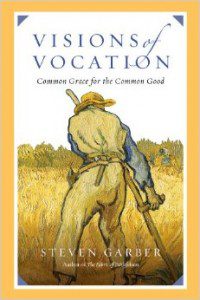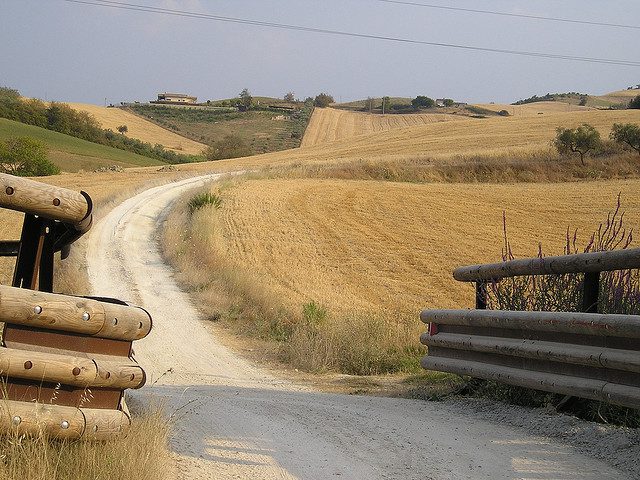 This excerpt from Steve Garber’s book Visions of Vocation is reprinted here with the kind permission of InterVarsity Press. Stay tuned as we continue to occasionally publish excerpts from the book here at Visions of Vocation the blog. And get the book from IVP at this link!
This excerpt from Steve Garber’s book Visions of Vocation is reprinted here with the kind permission of InterVarsity Press. Stay tuned as we continue to occasionally publish excerpts from the book here at Visions of Vocation the blog. And get the book from IVP at this link!
[Steve writes about some of his friends:] In the relationships and responsibilities of common life, they see themselves as implicated in the way the world is and ought to be. They see themselves as having vocations that call them into life, into the world—into a way of knowing that implicates them, for love’s sake. And in the unfolding of my life, living where I have lived, working where I have worked, I have met some of those people.
While I first met Robin when she was an undergraduate, I got to know her one summer when she entered into a month-long summer program of study called Knowing and Doing. There were lectures and readings, but there was also a lot of swimming and biking, with wonderful eating too. Politically serious, she found her first job at the Urban Institute, an economic and social policy research center and, remarkably, she is still there many years later.
D. J. moved to Washington after college, like thousands before him, looking for a job on Capitol Hill. He entered into an unusual community of men who chose to have a life together— Bonhoeffer-shaped— as they worked away at first jobs a  few blocks away in the Senate and the House. In those years I had some responsibility for the life and times of the large townhouse on East Capitol Street where they lived, and I met him there. I remember one week in D. J. and Robin’s lives with a smile. Thoughtful people, gifted people, serious people, wonderful people, each one had scheduled a lunch with me within a few days of the other. I was teaching on Capitol Hill at the time, and so we met in Union Station, in the same little café both days. They were longer conversations, but in the end it was clear that he was interested in her, and she in him. Yes, I smiled, knowing what I now knew— and I encouraged them to talk with each other. They did, happily, and a few months later were married.
few blocks away in the Senate and the House. In those years I had some responsibility for the life and times of the large townhouse on East Capitol Street where they lived, and I met him there. I remember one week in D. J. and Robin’s lives with a smile. Thoughtful people, gifted people, serious people, wonderful people, each one had scheduled a lunch with me within a few days of the other. I was teaching on Capitol Hill at the time, and so we met in Union Station, in the same little café both days. They were longer conversations, but in the end it was clear that he was interested in her, and she in him. Yes, I smiled, knowing what I now knew— and I encouraged them to talk with each other. They did, happily, and a few months later were married.
Robin continued on at the Urban Institute, working at some of the toughest questions of our common life. None were ever easy, as they involved history, politics and economics, always incarnate in a particular place with particular people. Because her own passions have been for “doing justice, loving mercy , walking humbly with God” for as long as I have known her, her analytical skills are never offered in the abstract , as if the research of the Institute is for ivory-towered policy wonks who live far away from ordinary people in ordinary places. For her, it always has to be worked at on the ground, in life.
D. J. kept at the Hill for a few years, earning his proverbial spurs by helping Congress move into the Internet age. That experience was the seedbed for the years that have followed, and he has taken that knowledge into a world of work that has him in places all over the face of the earth, mostly through the strange graces of websites and social networks. From contracts with military superpowers to the Brooklyn Hip-Hop Academy, from the Blood:Water Mission to International Justice Mission, he is a storyteller, deeply and professionally so. His great delight is to listen well and then help an organization tell its story through the wonders of the web. They have little girls now, growing as the years pass, and together they have found a way to have a life as a family that is good for all.
Good is a proximate word , of course, as it is not the same as perfect. But for any honest person, none of us knows a life that is perfect. There are bumps and bruises we all know too well, and we find them not only at home but at work. The harder question is the same: Knowing what we know , what are we going to do? Knowing our frailties and the frailties of the world, what will do? To choose to step into frailty— or, as Berry describes Uncle Peach, being “poor , hurt, mortal”— is what a vocation is all about. We are called to care, especially about complexity because that is the world we live in.
There is never a question that comes to Robin at the Urban Institute that seems simple: “Ah, that one’s easy!” There are too many factors, too many issues that have to be sorted out, often too much institutional injustice that has skewed the story from beginning to end. She keeps at it though, as she sees these as the questions of her life. For D. J. it is the same, but different. He loves his work, and he is very good at it— not only the technical aspects, which matter very much, but the heart of it, which matters too. For him there is always a longing that his work address both that which is wrong and that which might be and must be. Whether it is kids in Brooklyn or political complexity in nations scattered across the globe, he wants the work of his hands to matter, to be part of “tearing a corner off of the darkness,” in Bono’s poetic image. We all do.
Image: Roberto La Forgia, “The Way.”
Taken from Visions of Vocation by Steven Garber. Copyright (c) 2014 by Steven Garber. Used by permission of InterVarsity Press, P.O. Box 1400, Downers Grove, IL 60515-1426. www.ivpress.com











